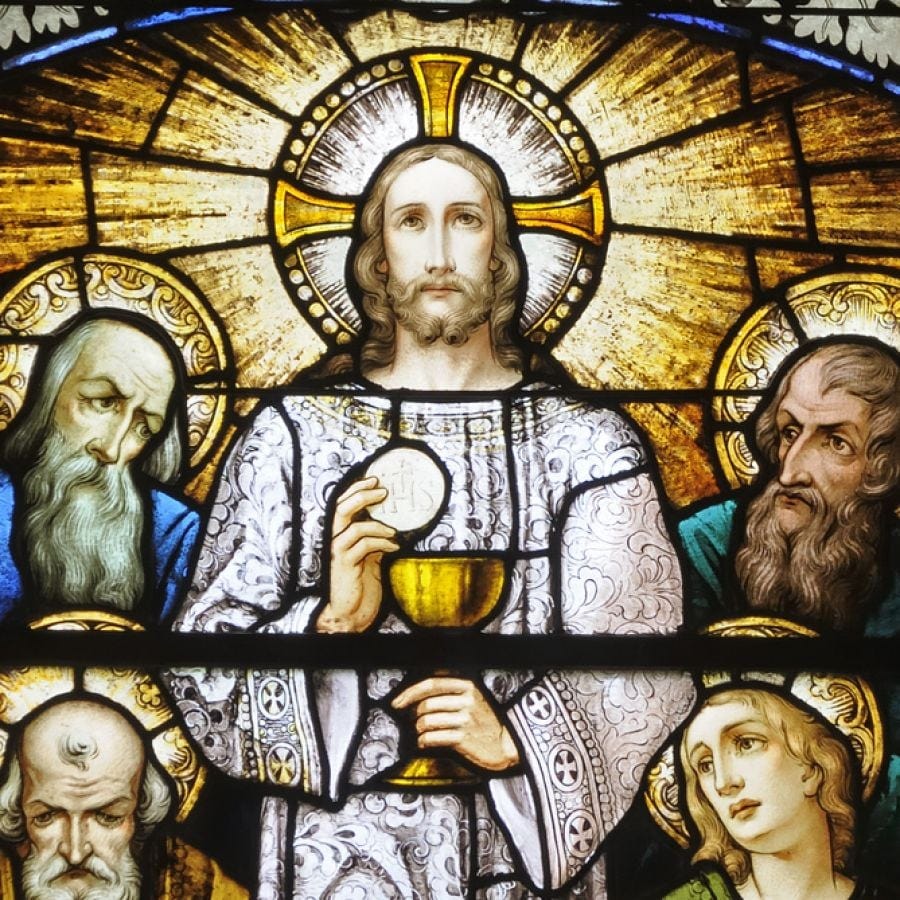Faith for all Defects Supplying
Gospel Reflection for Wednesday, May 7, 2025
Today’s Gospel is a section from the Bread of Life discourse. This is one of the most important passages in all of Scripture, encompassing the Catholic Church’s teaching on the Holy Eucharist as the Body, Blood, Soul, and Divinity of Jesus Christ. Many Protestant thinkers will read John 6 as a metaphor for needing the virtue of faith and saying that when Christ speaks of eating His flesh and drinking His blood, He is merely speaking in parabolic terms. They are half correct.
The Bread of Life discourse can be separated into two parts: the first part includes verses 22-51, roughly, and the second part includes verses 52-71. These two parts have to be seen together for the discourse to make any spiritual or theological sense. We cannot throw one part, with its core teachings, out the window and merely concentrate on the one that remains.
The second part, in which the Doctrine of the Eucharist and the True Presence is found, forms a large part of what Catholics normally concentrate on, and rightly so. It is here that we find the very clear language of Our Lord:
“Truly, truly, I say to you, unless you eat the flesh of the Son of man and drink his blood, you have no life in you; he who eats my flesh and drinks my blood has eternal life, and I will raise him up at the last day. For my flesh is food indeed, and my blood is drink indeed. He who eats my flesh and drinks my blood abides in me, and I in him.” John 6:53-56.
This is some of the most powerful language found in Scripture dealing with the True Presence of Christ in the Eucharist. This is core to the Eucharistic Theology of the Catholic Church and has been for 2000 years.
However, today’s Gospel takes from the first section that I outlined above. This part is a necessary prerequisite for the Christian before coming into the full Doctrine of the Eucharist. If we say that part two of the Bread of Life discourse concerns the Eucharist properly speaking, what are we then going to say that part one deals with?
The Virtue of Faith.
Jesus said to the crowds, "I am the bread of life; whoever comes to me will never hunger, and whoever believes in me will never thirst. But I told you that although you have seen me,
you do not believe. Everything that the Father gives me will come to me, and I will not reject anyone who comes to me, because I came down from heaven not to do my own will but the will of the one who sent me. And this is the will of the one who sent me, that I should not lose anything of what he gave me, but that I should raise it on the last day. For this is the will of my Father, that everyone who sees the Son and believes in him may have eternal life, and I shall raise him on the last day." John 6:35-40.
In part one of the Bread of Life discourse, Our Lord is calling the people to faith in Him. Faith is the beginning of everything that comes after in this discourse. St. Thomas speaks very beautifully on the Eucharist in the Summa Theologiae. He writes:
“The presence of Christ’s true body and blood in this sacrament cannot be detected by sense, nor understanding, but by faith alone, which rests upon Divine authority.”1
This simple yet profound truth is the very foundation of the Doctrine of the Eucharist. Unless one has faith, they will never be able to perceive the Flesh and Blood of Jesus Christ in the Eucharist. This is why Our Lord orders the discourse the way that He does. He first calls the people to have faith in Him. The reason for this is because what He is about to reveal to them requires faith. He then reveals the beauty of the gift of the Eucharist, the substantial presence of Jesus Christ under the accidents of bread and wine. As St. Thomas says, we cannot detect Christ in the Eucharist without faith.
The 66th verse of this chapter shows us the outcome of those without faith:
“After this many of his disciples drew back and no longer walked with him.” John 6:66
These disciples found the limit to their faith. Christ called, and they did not answer. He calls each one of us to faith in Him so that we might approach this wonderous Sacrament worthily and with great devotion. The more devoted we are to the Eucharist when we receive it, the more efficacious it is in bringing us to that eternal life promised by Christ.
Truly, if we believe in Christ and eat His flesh and drink His blood, we will have eternal life. The Tantum Ergo speaks beautifully of this truth of faith:
Down in adoration falling,
Lo! the sacred Host we hail;
Lo! o'er ancient forms departing,
newer rites of grace prevail;
faith for all defects supplying,
where the feeble senses fail.
To the everlasting Father,
and the Son who reigns on high,
with the Holy Ghost proceeding
forth from Each eternally,
be salvation, honor, blessing,
might and endless majesty. Amen.
St. Thomas Aquinas, Summa Theologiae, IIIa q. 75, a. 1.



Again you make the Scriptures come alive and easily understood! Again you inspire faith! Thank you!